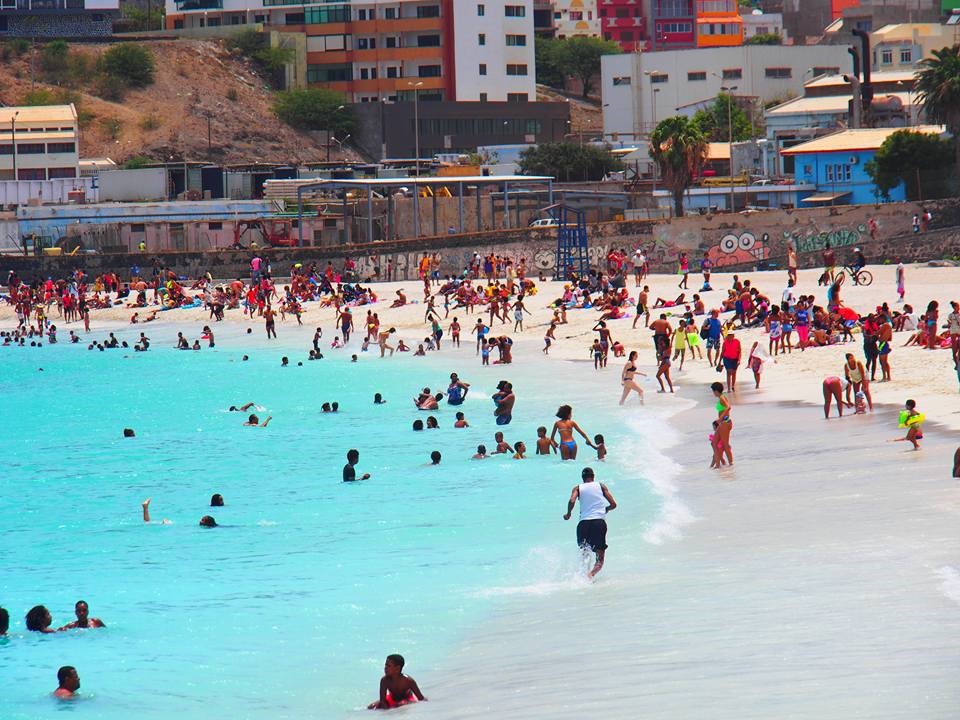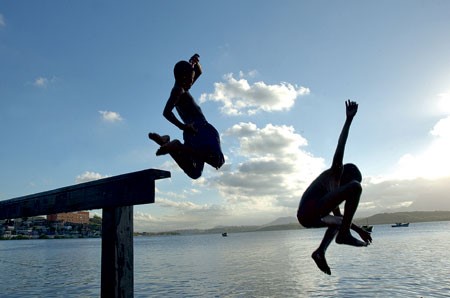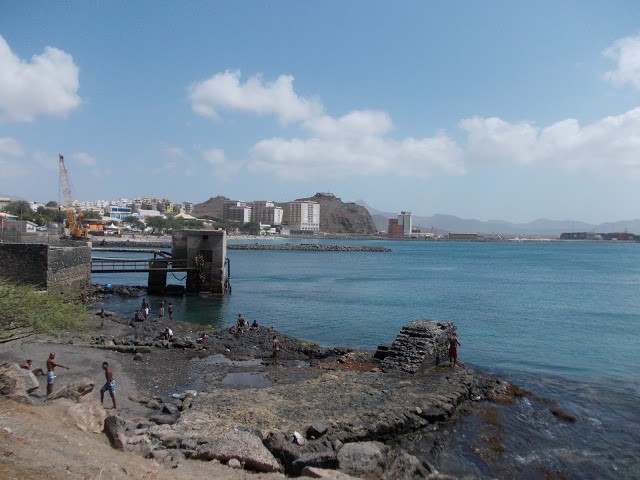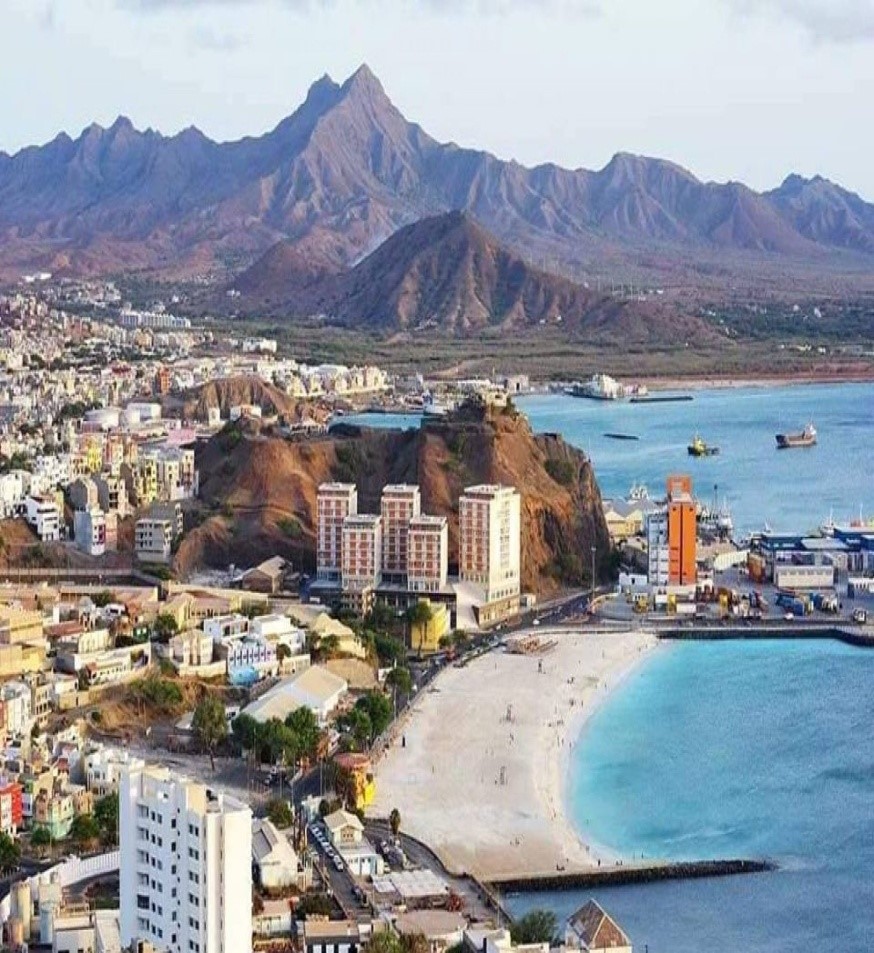Read the original Portuguese version here. To discuss this and other finalists, visit Mormon Lit Lab.
A Sunday at Laginha
by César Augusto Medina Fortes
translated by Katherine Cowley
As we did every Sunday, my siblings and I rose early and attended church. After church, after eating, we started making our plans, because the afternoon was always reserved for us, the children of the Ribeira Bote and the Ilha de Madeira, to visit Laginha Beach. I knew it wasn’t the right thing to do on the Lord’s day, so I would hide from my mother, because if she knew what I planned we would fight about it.
I left to find my friends. There were no boundaries and no rules. We entered the front door of missus Maria of Valentim and left through her back gate, passing through her home to reach Ilha de Madeira—the neighborhood called Island of Timber—where we invited our friends Johny de Carola, Aristides, Tino, Djoy and others. Jair of Fátima always wanted to go with us, but his mother rarely let him. Ivone of missus Ciza was always willing to come and would join the front of our line.
After informing our friends in Ilha de Madeira, it was time to head over to 10th Street. For a shortcut, we would enter the back gate of missus Sabina’s house and leave by the front door, which put us directly on 10th Street. Our families were all friends and we could enter one house or another without problems, as long as we greeted everyone with civility. Civility was something we never lacked, for if we were lacking the adults had permission from our parents to chide us and then we would immediately follow their orders.
On 10th Street we called for them—Paulo of Mr. Jon Bloco, Rogério, Chimaz, Papai, Livramente, Nelsa d’Ya, Valdemar of madame Alice, my brother Joselito, my cousins, the twins Paulo and Jorge, Sílvio, as well as Renato and Dixa of Poia, Djão of madame Linda, Jair, Gui and Paulo of missus Mari of Lurdes, Nelson, Zé and Didi of madame Montinha, Zé of madame Rosário, Ligim of madame Eduina, Ligim of madame Polina, Johny of madame Teresinha, Didi of madame Olívia and many others, the group large and increasing in size as we passed, whistling, by the doors of different families. We had a whistle as a code and when one of us gave the tune, the person inside would return it and quickly open the door. We would all gather together on the street and make sure no one was missing so that we could head to Laginha Beach. Our route took us through the Alto de Sentina, Alto de Mira-mar, Praça Nova, and then to Laginha itself.
On the way we would play games, as all children do, and one of those games was to push. Near the restaurant called Sodade, someone remembered to give a push to Jorge of Mana and he went down with such force that he fell against a gate. The gate opened, and as the house had a few steps, Jorge tumbled down the stairs until he stopped in the middle of the backyard. The lady of the house was startled by the noise and went at once to help Jorge get up, and she asked him if he was alright. Jorge of Mana, as he was clever, said that he might soon faint. The poor lady went quickly and brought him a sweet bread and a cup of juice. Jorge ate and licked his lips. Once we were out of there Zé of missus Montinha said, “Caramba. Jorge is lucky even in a fall. Seriously.”
And so we continued on our path to Laginha. We passed the Superinha factory where they make a soda that, for us, was the best in the world. Near the technical school, we discovered a date tree bursting with dates, yellow and sweet, ready for us to eat. It was time for our fruit shooters, Valdemar and Tchitchi. They picked up stones and threw them into the bunches, and then those that were youngest of our group picked up the dates that fell on the ground and distributed them to everyone. From there, we caught sight of the beautiful sea of the Laginha. But the walk from there to the beach was a torment. The tar seemed to melt in the hot sun, and we, with our bare feet, would always skip across because of how it burned us. There were times when some of us ended up with blisters on the soles of our feet.
Finally, we would arrive at the much desired Laginha beach. Everyone ran for the water. We competed, diving and jumping in the waves. After, we went to our “diving board”—the jumping point at the Stone Pier. We would make a line and all of us would jump and when we dove into the water, it was mandatory to swim through the tunnel under the dock. João was almost always the first to pass through it and the others would follow him. When we reached the other side, we arrived almost out of breath, but happy. I remember there was one time when we all traversed the tunnel, but when we rose out of the water we were missing someone, Nelsa d’Ya. Valdemar quickly dove down and went to find him. He had been stuck in a narrow part of the tunnel, for Nelsa d’Ya was a big guy.
Once we had gotten over our scare and we had Nelsa d’Ya on dry land, we began to laugh until we fell onto the sand. As children, we found it a great joke. Funny things always happened to Nelsa d’Ya. After spitting up some water, he soon began to do somersaults, something he was very good at.
In the meantime, Kunhanha had the crazy idea of scaling the Electra sea water abstraction plant to the top of the tower, where we could jump into the water. Climbing up wasn’t difficult. The older ones helped the younger ones until we’d all succeeded at reaching the roof of the building, which must have been around ten meters high. From that summit, we could take in the whole of Laginha beach, which was full of people. They looked like a group of little ants stretched out across the beach. We could see the entire Bay of Mindelo and some ships unloading winter corn, coming from the United States and going directly to the silos of MOAVE, where it would later be distributed to the population fleeing famine. The sun was strong as it hit our skin, but we could not remove our feet from that rooftop, with a view that would please any tourist and for us was free.
After all the good parts, now came the bad part. Climbing down the side of the building was impossible. The only way off was to jump into the water. From the top, we could see the water down below and I was engulfed in terror. We all regretted accepting the challenge. And I kept asking God to help us in this difficult moment. No one took the first jump. We were all afraid. And suddenly we heard a noise in the water: “Tchiluf.” We went to see; it was João who had taken the leap. And Zé of madame Montinha yelled out, “What a rogue!” And João yelled from below, “The water is good and warm. You can jump.”
And from that moment, they began jumping, one after another, like dolphins. Only Sílvio and I stayed there, too afraid to jump. Our fear was if there was any iron in the water we would be impaled, for we had dived there earlier and we knew that in this section there were many iron plates and scraps on the sea floor. We didn’t want to risk it. We stayed there, watching our friends, down below, playing in the water, and we, trapped by fear on top of the Laginha water plant. The sun began to set behind Monte Cara and night covered Laginha beach. Now we could see almost nothing, from there at the top.
It was then that we heard a voice, it was Didi of madame Montinha shouting, “César of madame Mari D’Vinha and Sílvio of madame Rosa, set aside your fear. You have to jump. If you don’t, you will be left here alone on the beach of Laginha.”
In that moment, we realized it was “now or never.” We took each other’s hands, we closed our eyes, we said a prayer to God that he would protect us, and, screaming, we leapt out, cannonball style. We abode in the air for an eternity before we reached the water. We hit our “tails” with great force on the water. You see, it was literally a leap in the dark. It was a lonely affliction. We swam and reached our friends, who had already been waiting for us for quite some time. And we, full of pain in our butts, were still to be ridiculed. They rolled on the sand with so much laughter, every single time they saw us walking with our hands on our behinds, rubbing at the pain from the cannonball jump.
And we set off towards Ribeira Bote, our beloved neighborhood. We entered our home quietly, afraid to take a beating from our mother. She must have been very worried with all of life’s problems, for she did not even notice us. Which was just as well, for we didn’t have any more space for any more smacks, with the size of the pain we already felt. We took saltpeter, we ate our dinner, and we went to sleep dreaming of Laginha.



